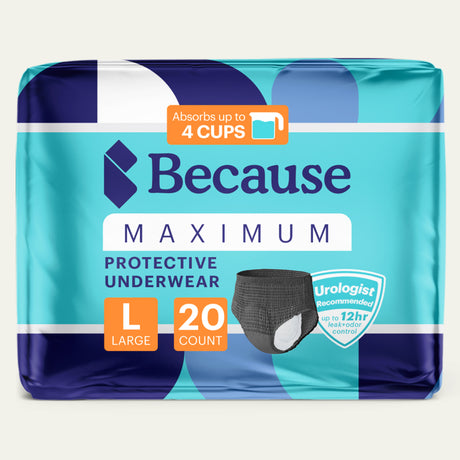Medically reviewed by Dr. Temitope Rude, MD
Urinary tract infections (UTIs) cause one-quarter of all hospitalizations of older people in the United States yearly. UTI symptoms in older adults may be difficult to spot, as they don’t always match those younger people experience when they develop urinary tract infections. Sudden confusion is one warning sign of UTI in elderly patients that may get overlooked. This article will discuss why it happens and what family members and other caregivers can do to help someone with UTI-associated delirium or confusion
What Is UTI Delirium?
UTI delirium is the term for a sudden change in cognitive ability that occurs in older adults as part of the symptoms of urinary tract infections. Around one-third of elderly patients who develop UTIs experience delirium. People who develop UTI delirium may exhibit the following warning signs.
Lack of Awareness
UTI delirium can make a person disappear into their mind. They may no longer be able to focus on things or change topics sporadically during a conversation. If you ask them questions, they may repeat the same answers or redirect the conversation to another topic. Older adults may become withdrawn and not interact with others or their environment if they’re experiencing confusion with a urinary tract infection.
Cognitive Difficulties
UTI delirium can impact memory. In mild cases, this may manifest as forgetfulness of recent events or struggling to remember certain words. More severe cases can leave a person unsure who or where they are. The mental state associated with severe delirium can also leave a person unable to understand speech, read, or write.
Behavioral and Emotional Challenges
Emotional and behavioral symptoms often accompany delirium in older adults, exhibiting signs of agitation and anger. Depression is another common symptom of delirium from UTIs and may show up as listlessness, hopelessness, sadness, and a loss of interest in favorite activities. Conversely, some people seem euphoric while in a state of delirium. With severe symptoms, people may call out, moan, make odd sounds, or even experience hallucinations.
If your loved one is experiencing any new symptoms of cognitive impairment, contact a medical professional immediately. Your doctor will be able to give the best advice on treatment course whether that be further courses of antibiotics, if the delirium is caused by a urinary tract infection, or if a trip to the hospital for further testing is warranted.

Why Does UTI Cause Confusion in the Elderly?
Although we understand a lot about urinary tract infections, doctors still don’t fully understand why UTIs trigger confusion in seniors. More research will help determine exactly why some older adults become confused. Still, a previous study conducted at Cedars-Sinai by a team headed by Dr. Shouri Lahiri, director of the hospital’s Neurosciences Critical Care Unit and Neurocritical Care Research unit, provides a good starting point for future investigations.
Based on observations made in this animal study, researchers concluded that a specific protein known as interleukin 6 (IL-6) may be to blame. The immune system releases this protein in response to the presence of bacteria like Escherichia coli (E. coli) in the urine. Although its job is to help the body fight off the infection, in older women and men, levels of this protein may become too high and negatively impact brain function. The researchers found that administering an antibody that fights IL-6 to laboratory mice suffering from urinary tract infection-related delirium eased symptoms while allowing the rodents to navigate a Y-shaped maze.
More well-designed studies involving large groups of human patients will test this theory further. Still, it indicates a link between the immune response and confusion associated with urinary tract infections.
How Long Does it take for Confusion from UTI to go away?
In most cases, delirium from urinary tract infections goes away, but how quickly it resolves varies. In some cases, delirium may begin to ease within 24 hours after the start of antibiotic treatment. In other cases, it may persist for several weeks after clinical symptoms start.
Factors that Can Affect Recovery Time:
- Overall Health Status: Individuals with weakened immune systems or chronic illnesses are more prone to extended recovery times.
- Promptness of Treatment: Early intervention with antibiotics and hydration can reduce confusion by controlling the infection and eliminating toxins from the urine and urinary tract more quickly.
- Type and Severity of Infection: Urinary tract infections that have spread to the upper urinary tract or bloodstream tend to cause more severe symptoms, extending recovery time.
- Baseline Cognitive Function: Individuals with pre-existing cognitive impairments, such as dementia, may experience slower or incomplete resolution of confusion.
- Supportive Care: Managing symptoms like fever and electrolyte imbalances through supportive care helps restore cognitive clarity and speeds recovery.

Common Causes of UTI in Older Adults
As previously mentioned, urinary tract infections are one of the most common reasons for hospital stays among older adults. Many studies indicate that older individuals are at an increased risk for UTIs, and there are many reasons why, including:
- Urinary retention: Changes in the bladder and the pelvic floor muscles can make it more difficult for the bladder to empty. When urine is trapped in the urinary tract, the risk of bacteria increases as does the risk of infection.
-
Incontinence: Many older adults struggle with incontinence issues and bedwetting. Not changing incontinence protection often enough or inadequate incontinence skin care could introduce bacteria to the urethra, bladder, and kidneys resulting in infections.
- Menopause: Hormonal changes during menopause leave older women more vulnerable to the bacteria that cause urinary tract infections. However, asymptomatic bacteriuria, or bacterial colonization, is very common in elderly women and does not always warrant antibiotic treatment. Medical advice is needed to avoid an overuse of antibiotics.
- Enlarged prostate: Men with difficulty urinating due to an enlarged prostate are more at risk for urinary retention and urinary tract infections.
-
Lack of mobility: Older adults who struggle to perform daily living tasks may be unable to maintain their hygiene habits, increasing the risk of UTIs. They may also have difficulty making it to the bathroom and may hold in urine as a result. People who don’t urinate often enough are less likely to flush bacteria out of their urinary tracts, increasing the risk of urinary tract infections.
- Immune system issues: As we age, our immune systems become less able to defend our bodies from infections properly. Older adults may not be able to fight off bacteria quickly, so urinary tract infections are more likely to develop. In addition, seniors are more likely to experience more severe infections when bacteria from the lower urinary tract enter the kidneys.
Recognizing UTI Symptoms in Elderly Adults
Older adults may experience classic UTI symptoms, plus other less common warning signs. As a caregiver for an older adult, keep an eye out for the following symptoms:
- Frequent urination
- Urine leaks
- Burning sensation upon urination and around the urethra
- Pelvic pain and pressure
- Not being able to empty the bladder when urinating
- Sudden, sharp decline in cognitive ability, behavior, emotional state, or awareness
- Low blood pressure
- Loss of appetite
- Drowsiness
- Increased heart rate
- Unsteadiness when walking
- Sleep changes
- Fever
- Nausea
Get medical attention if your loved one shows any of the above symptoms. You can see the family doctor with mild symptoms, but severe symptoms warrant a trip to the hospital emergency department.
How Is UTI with Confusion Treated?
The treatment for UTI with confusion is a course of antibiotics to eliminate the underlying infection. Older adults may need to take more antibiotics or be on them longer. Sometimes, doctors may want to admit a person to the hospital to receive antibiotics intravenously. If an older adult with UTI-associated delirium remains at home, a caregiver should be present around the clock for their safety.
Managing and Caring for Older Adults with Confusion from UTI
If you’re caring for someone with urinary tract infection-related confusion, follow these tips:
- Keep them hydrated: Encourage your loved one to drink plenty of water and other fluids to support urine production.
- Ensure that they stay clean and dry: If your loved one wears incontinence protection, change the pads or underwear regularly. Cleanse their private area thoroughly with a spray or wipes. Continue to follow a good incontinence care routine to help prevent future UTIs.
- Use antibiotics as prescribed: Make sure your loved one takes them on a schedule and in the manner their doctor recommends. This routine may mean taking the drug on an empty stomach or with food. Even if their symptoms resolve sooner, use all of the antibiotics prescribed.
- Reassure them: Don't try to correct our loved one if they say things that don't make sense or misremember something. If they become depressed, anxious or agitated, reassure them that they're safe and that you're here for them.
- Be on the lookout for changes in condition: If your loved one develops new symptoms or delirium worsens, let their doctor know.
The Connection Between UTI with Confusion in Adults with Alzheimer’s and Dementia
So far, we’ve discussed UTI delirium in seniors who don’t have mental health issues or cognitive impairment. The situation becomes more complicated in individuals who have mental illness, dementia, and Alzheimer’s disease. Older adults with one of these medical conditions may exhibit symptoms of delirium even when they don’t have an active infection. Additionally, they may not be able to adequately communicate that they’re in pain or experiencing other symptoms. As a result, professional and family caregivers may find it difficult to tell when these older patients have UTIs.
Alzheimer’s and dementia patients often have one or more key urinary tract infection risk factors. They may wear daytime or overnight incontinence protection, have mobility problems, or struggle to maintain a proper hygiene routine. This issue means that people with cognitive disorders may develop UTIs more frequently.
For years, concern about the higher risk for UTIs associated with Alzheimer’s and dementia led doctors to prescribe treatments for UTIs as a precautionary measure. The line of thinking was that even if home test strips or a lab-analyzed urine sample didn’t show signs of an infection, it was better to administer antibiotics to prevent more serious upper UTI infections.
Unfortunately, inappropriate antibiotic use for those with Alzheimer’s and dementia without UTIs can trigger delirium symptoms. Caregivers may then mistake the delirium as a UTI symptom and believe the patients did have an infection all along, leading to a significant overdiagnosis of urinary tract infection in seniors with memory loss. Over time, this has led to antibiotic resistance (microorganisms that evolve to no longer respond to conventional antibiotics).
The good news is that the medical community is becoming increasingly aware of this problem. At many hospitals and long-term care facilities, it is no longer commonplace for medical staff to preventatively administer antibiotics to patients with cognitive health conditions. Instead, doctors now go by the results of the urine culture and avoid antibiotics unless bacteria are present in samples.

Related Articles:
- What Doctor to See for a UTI
- The Best Herbs for UTI Support + When to See Your Doctor
- 11 Tips to Help Reduce the Stress of Caregiving for a Person with Urinary Incontinence
Frequently Asked Questions:
How are urinary tract infections diagnosed?
Urinary tract infections are diagnosed through a combination of medical history, physical examination, and laboratory tests. A healthcare provider may perform a urinalysis to check for signs of infection, such as white blood cells, red blood cells, and bacteria in the urine. A urine culture can also be conducted to identify the specific bacteria causing the infection and determine the most effective antibiotic treatment. In recurrent or complicated cases, imaging tests like ultrasounds or CT scans may be used to examine the urinary tract for abnormalities.
My loved one's urine culture showed bacteria, but the doctor didn't prescribe any antibiotics, what does that mean?
If a urine culture shows bacteria but the doctor does not prescribe antibiotics, it may indicate asymptomatic bacteriuria—a condition where bacteria are present in the urine without causing symptoms. Asymptomatic bacteriuria is common, especially in older adults, diabetics, and individuals with urinary catheters, but it usually does not require treatment unless the person is pregnant or undergoing certain urologic procedures. Treating asymptomatic bacteriuria with antibiotics can lead to unnecessary side effects and contribute to antibiotic resistance. Doctors typically recommend treatment only if there are symptoms of a urinary tract infection, such as pain, burning, or fever.
How do I know if my loved one is suffering from confusion related to a UTI or if their dementia is flaring up?
Distinguishing between UTI-related confusion and a dementia flare-up can be challenging, but a sudden change in mental status, such as acute confusion, agitation, or hallucinations, may suggest a UTI. Unlike dementia, which progresses gradually, UTI-related delirium often appears suddenly and may be accompanied by other symptoms like fever, urinary urgency, or pain. However, some individuals with dementia may not show typical UTI symptoms, making diagnosis more difficult. The safest option if you're unsure is to seek medical help to determine the cause and receive appropriate treatment.
Do catheters increase the risk of UTIs?
Yes, urinary catheters significantly increase the risk of UTIs. In fact, 44% of UTIs in hospitalized patients were attributable to indwelling catheters. Catheter-associated urinary tract infections (CAUTIs) occur when bacteria enter the urinary tract via the catheter, leading to infection. The risk of bacteriuria (presence of bacteria in the urine) increases by 3–7% each day a catheter remains in place. To mitigate this risk, it is crucial to use catheters only when absolutely necessary and to adhere to strict aseptic techniques during insertion and maintenance.
What causes recurrent UTIs in older women?
Recurrent urinary tract infections (UTIs) in older women are often caused by age-related changes such as decreased estrogen levels, which lead to thinning of the vaginal and urinary tract lining, making it easier for bacteria to invade. Other risk factors include incomplete bladder emptying due to weakened bladder muscles, pelvic organ prolapse, or conditions like diabetes that impair immune function. Frequent antibiotic use can also alter the natural microbiome, increasing susceptibility to infections. Additionally, asymptomatic bacteriuria (ASB)—the presence of bacteria in the urine without symptoms—is common in older women, but it does not require treatment unless symptoms develop, as unnecessary antibiotics can contribute to resistance and side effects.
Sources:
Cedars-Sinai. (2021, Dec. 2). Unlocking the cause of UTI-induced delirium. Cedars-Sinai Newsroom. https://www.cedars-sinai.org/newsroom/unlocking-the-cause-of-uti-induced-delirium/
Dutta C, Pasha K, Paul S, Abbas MS, Nassar ST, Tasha T, Desai A, Bajgain A, Ali A, Mohammed L. Urinary Tract Infection Induced Delirium in Elderly Patients: A Systematic Review. Cureus. 2022 Dec 8;14(12):e32321. doi: 10.7759/cureus.32321. PMID: 36632270; PMCID: PMC9827929.
Garibaldi, R. A., Mooney, B. R., Epstein, B. J., & Britt, M. R. (1982). An Evaluation of Daily Bacteriologic Monitoring to Identify Preventable Episodes of Catheter-Associated Urinary Tract Infection. Infection Control, 3(6), 466–470. doi:10.1017/S0195941700056599
































